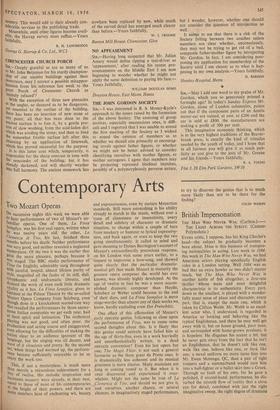Contemporary Arts
Two Mozart Operas
ON successive nights this week we were able to hear performances of two of Mozart's un- familiar operas. One of them, La Finta LeMPlice, was his first real opera, written when ''e was twelve years old, the other, La Clemenza di Tito, his last, finished three Months before his death. Neither performance was very good, and neither revealed a neglected Masterpiece. Of the two it was the earlier that gave the more pleasure, perhaps because it was staged. The BBC studio performance of Titus (in English), admirably sung throughout With careful, insipid, almost lifeless purity of style. magnified all the faults of its stiff, dull, drained and undramatic libretto, and urained the work of even such little dramatic vitality as it has, La Finta Semplice, given in German at the Palace Theatre by the so-called Mozart Opera Company from Salzburg, even though done in a knockabout second-rate way that recalled the performances by those anony- Mous Italian companies we get each year, had at least spirit and animation. The orchestral playing was not good, and often poor, the Production and acting coarse and exaggerated, even allowing for the difficulties of making the language, clear to an audience ignorant of the 'anguage, but the singing was all decent, and Most of it vivacious and pretty. By the second act, when things had warmed up, the perform- ance became sufficiently enjoyable to let us ehloY the work too.
This, if not a masterpiece, is much more than merely a miraculous achievement for a harmonic of twelve. His melodic inspiration and narmonic mastery were already, at their best, equal to those of most of his contemporaries at the height of their powers, and there are Seine numbers here of enchanting wit, beauty and expressiveness, even by mature Mozartian standards. Still more astonishing iS his ability already to match in the music, without ever a trace of clumsiness or insensitivity, every detail and subtlety of character or dramatic situation, to change within a couple of bars from mockery or humour to lyrical expressive- ness, and back again, or even to keep the two going simultaneously. It called to mind and gave Meaning to Daines Barrington's account of Mozart's extraordinarily precocious response, on his London visit some years earlier, to a request to improvise a love-song, and showed quite clearly that the particular dramatic- musical gift that made Mozart in maturity the greatest opera composer the world has ever known, was already highly developed. At the age of twelve in fact he was a more accom- plished dramatic composer than Haydn, Schubert or Weber could become to the end of their days, and La Finta Semplice is more stage-worthy than almost any of their works we, know, hardly excluding even Der Preischiitz. One effect of this affirmation of Mozart's early operatic genius, following so close upon the performance of Titus. was to cause some second thoughts about this. Is it likely that this genius could entirely have failed him at the age of thirty-five, even in a work hurriedly and unenthusiastically written, in a dead operatic convention? Even his last opera but one, The Magic Flute, is not such a general favourite as the three great da Ponte ones. It is dramatically less coherent and its musical greatness is more elusive. Many musicians are long in coming round to it. But when it is once discovered and experienced it over- whelms. Might not the same be true of La Clemenza di Tito, and should we not give it, and ourselves, another chance, or several chances, in imaginatively staged performances, to try to discover the genius that is so much more likely than not to be there for the finding?
COLIN MASON


































 Previous page
Previous page